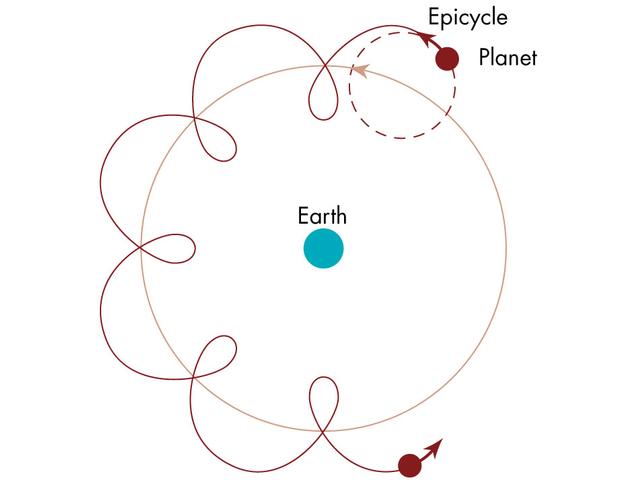|
home | what's new | other sites | contact | about |
||
|
Word Gems exploring self-realization, sacred personhood, and full humanity
The "epicycles" of Darwinism: not everything that's logical or
return to "Evolution" main-page
the Sun rises in the east, who could doubt this From the time of the ancient Greeks (and before), as a majority opinion, it was believed that the Earth was the center of universe. There was much common-sense justification for this; after all, the Earth seemed stationary enough, with the Sun and Moon rising and setting in apparent orbit around it. (See my article "Stars And Midnight Blue" for many examples of common illusion.) Confirming that this geocentric view was factual, evidence was offered that a stone dropped from one’s hand fell downward toward the Earth. All objects, the senses informed one, were drawn to this center of the universe. The stars above, the thousands of pinpoints of light, moved across the face of the night as a unified mass. However, five astral mavericks sailed erratically and, therefore, were called “wanderers”; the Greek word for which comes to us as “planet.” The five wanderers, along with the Sun and Moon, undoubtedly circumnavigated the Earth. The orbital path of each, the Greeks were certain, took the shape of a perfect circle because the construction of the universe was deemed to be perfect. However, a certain flaw was discovered in this celestial paradise: the wanderers – eventually, named after the Roman gods: Mercury, Mars, Venus, Saturn, Jupiter – sometimes proceeded in retrograde fashion, would dance backwards, like Michael Jackson's moonwalk. it's the epicycles, stupid The quest to explain this anomaly lasted many hundreds of years. Ptolemy (100 – 170 CE) finally devised a strategy to explain the wanderers’ “backward-forward” motion: the answer, he said, was epicycles.
The planets did not simply move flat-out ahead in their orbits around the Earth, Ptolemy postulated, but did loop-de-loops as they went along. These loopings, or epicycles, he suggested, were the cause of the "backwards motion” of the wanderers. This solution satisfied nearly everyone. It worked well on paper. You could depend on it. It was now possible to make accurate predictions of the future positions of the planets. The mathematics all worked out wonderfully, which seemed to seal the authenticity. There was one problem, however: none of it was true. The world would have to wait more than a thousand years for Copernicus to overthrow the geocentric model. One clue for him: the Ptolemaic vista required many dozens, more and more, so many of these epicycles to make the explanation coherent. As Dave Barry might have said, "It got so bad you couldn't let your dog run loose for fear of it dragging home an epicycle."
In the end, it all became too complicated and top-heavy, too contrived and convoluted, and too unbelievable, as Copernicus saw it, that God would have created the universe in such a bizarre loop-de-loop manner. The principle of “Occam’s Razor” – that of, the simplest answer is probably the correct one – would be violated on a cosmic scale. He didn't think so. Editor’s note: Copernicus wisely waited to publish his findings until he was on his deathbed, about to safely escape into the afterlife. Dear Mother Cult, he correctly reasoned, would not take kindly to the heresy of the Earth as mere ordinary wanderer in the Sun's neighborhood. The Blackrobes would see this as a power-haircut. Why? you might ask. Well, it’s just not as much fun to be God’s infallible representatives if your little planet is but one among possible millions out there.
the “epicycles” of Darwinism: things you have to believe to keep your story straight As one surveys the literature of Darwinistic thinking, the many examples of “you say that and so we now have to say this,” one experiences a certain heaviness of spirit. Who will find the truth in this gamesmanship? Slippery ad hoc counter-arguments, proliferating in the vein of epicycle-explanation, litter the debate. We are burdened with half-baked ideas, ill-fitting cogs in the Darwin-machine, for which there is no empirical support, no hard scientific evidence. It's "epicycle" thinking. The explanation may be logical of sorts, given a certain premise, and it may seem to answer some objections, but none of it speaks to an elegant simplicity. Too much convolution, too much inventing answers on-the-fly, too much contrivance. Just because an explanation offers a semblance of coherency does not mean it’s true. In Darwinism we’re offered an array of arguments which present thin veneer of logical consistency but lack foundation in real science. It's just more "a priori assumption," as we've seen. Epicycles were big news for the ancients, appeared to solve a problem, but, the reality is, this view -- based on unwarranted metaphysical assumption that the Earth had to be, "must be," the center of the universe -- set back advancement in astronomy for over a thousand years. Like my "joker is wild" principle, they had to believe in epicycles to make the whole edifice tick. Science was mired in bad ideas, and cultish inertia made it unpopular to suggest otherwise. We need a fresh start, we need the facts, and a willingness to follow the truth wherever it leads, with the old cluttering paradigm thrown out, and a clear-thinking Copernicus to set us right. Each of us can do this.
|
||
|
|


